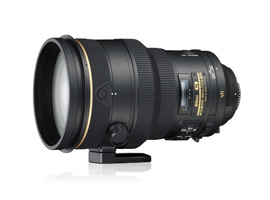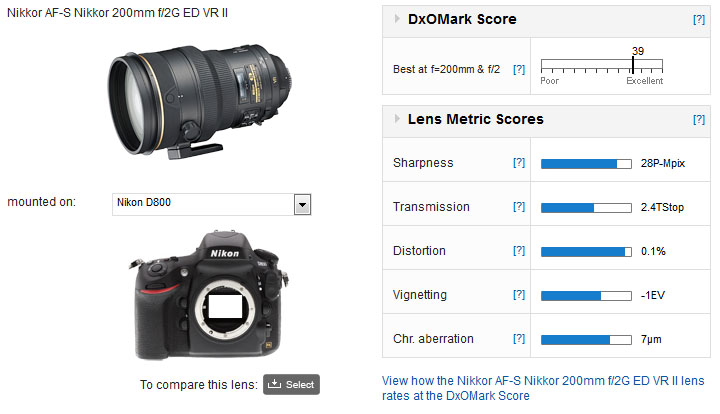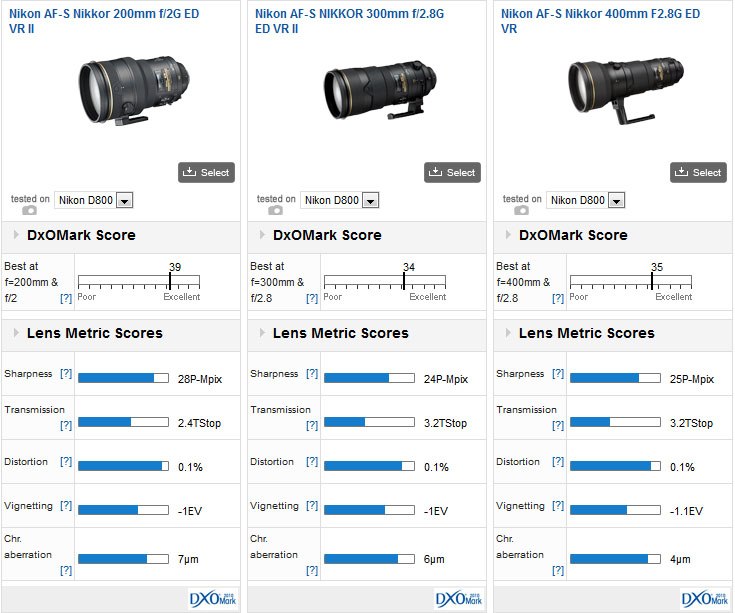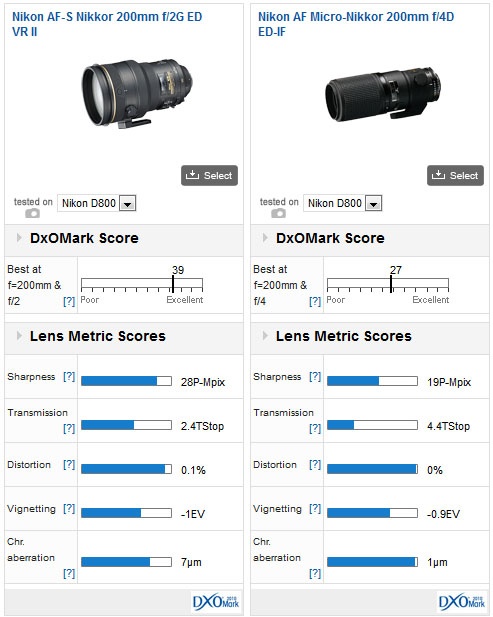Introduction
With a full-aperture of f/2.0 this lens is the fastest telephoto in Nikon’s current line up. As the latest in a long line of 200mm f/2.0 models that date back to the 70’s this lens is rarely publicized, and even today, the autofocus 200mm f/2.0 is made in relatively small numbers. It’s perhaps this rarity coupled with the lens’ reputation for stellar image quality that makes this one of the most intriguing lenses in the firm’s range.This version was updated in September 2010 with the new 4-stop VR II specification, and Nano Crystal Coat. In addition to the usual three ED glass-elements of Nikon’s super-telephoto lenses, before the up-dated 80-400mm was introduced, this model was the only lens in the range to feature an additional Super ED glass element to reduce chromatic aberration. Weighing in at 2,930g, the lens adopts an ultrasonic type AF motor, focuses to just 1.9m (6.2 ft.) and costs a not insignificant $5,820.
Mounted on a 36Mpix D800 the lens achieves a DxOMark Lens Score of 39, making it one the best performing lenses ever measured in our labs. What’s more with a Sharpness score of 28P-Mpix this lens is the sharpest Nikon mount lens we’ve tested, putting ahead of lenses like the Nikon 85mm f/1.4 and f/1.8 models but also the Sigma 35mm/1.4 and the recently tested 300mm and 400mm f/2.8 telephotos. Additional individual lens metrics scores reveal the lens to have negligible distortion, mild vignetting and reasonably low levels of chromatic aberration. Transmission is very good, though not quite matching the theoretical f/2.0 maximum.
DxOMark Lens ranking for Nikon mount models
 |
 |
 |
| Nikon AF-S Nikkor 85mm f/1.4G | 2199 | 40 |
| Nikon AF-S NIKKOR 85mm f/1.8G | 690 | 40 |
| Sigma 35mm F1.4 DG HSM A Nikon | 899 | 39 |
| Nikon AF-S Nikkor 200mm f/2G ED VR II | 5899 | 39 |
| Carl Zeiss Makro-Planar T 100mm f/2 ZF2 Nikon | 1840 | 36 |
| Samyang 85mm f/1.4 Aspherique IF Nikon | 328 | 36 |
| Sigma 85mm F1.4 EX DG HSM Nikon | 969 | 35 |
| Nikon AF-S Nikkor 400mm F2.8G ED VR | 8999 | 35 |
| Nikon AF-S Nikkor 24mm f/1.4G ED | 2200 | 34 |
| Samyang 35mm F1.4 AS UMC Nikon | 599 | 34 |
| Carl Zeiss Distagon T 35mm f/1.4 ZF2 Nikon | 1843 | 34 |
| Carl Zeiss Distagon T 25mm f/2 ZF.2 Nikon | 1700 | 34 |
| Nikon AF-S NIKKOR 300mm f/2.8G ED VR II | 5900 | 34 |
| Nikon AF-S NIKKOR 28mm f/1.8G | 699 | 33 |
| Nikon AF Nikkor 85mm f/1.4D IF | 1230 | 33 |
| Carl Zeiss Distagon T 35mm f/2 ZF2 Nikon | 1005 | 33 |
| Nikon AF-S NIKKOR 35mm f/1.4G | 1797 | 33 |
| Nikon AF Nikkor 50mm f/1.4D | 329 | 32 |
| Nikon AF-S Nikkor 50mm f/1.4G | 448 | 32 |
| Sigma 50mm F1.4 EX DG HSM Nikon | 499 | 32 |
DxOMark Sharpness Ranking for Nikon mount lenses
Nikkor AF-S Nikkor 200mm f/2G ED VR II vs Nikon AF-S NIKKOR 300mm f/2.8G ED VR II vs Nikon AF-S Nikkor 400mm F2.8G ED VR
If we compare the ultra-high speed 200mm f/2.0 model against the firm’s f/2.8 telephotos the lens is the best performer of the three. That said, all three are outstanding performers. Regardless of focal length, there will be no disappointments.
Nikkor AF-S Nikkor 200mm f/2G ED VR II vs Nikon AF Micro-Nikkor 200mm f/4D ED-IF
We’ve not yet measured the equivalent Canon EF 200mm f/2.0L IS USM model but comparing the lens with the Nikon AF Micro-Nikkor 200mm f/4D ED-IF reveals some interesting facts, even if the two lenses are designed for different roles. First, the 200mm f/2.0 is much sharper. In fact the 19P-Mpix Sharpness score of the Micro-Nikkor on the D800 is a little disappointing.
Second, the Micro-Nikkor has extremely low Chromatic Aberration.
While it’s a pity we’re unable to compare the Nikon 200mm f/2.0 against its rival Canon offering, the Nikkor lens is optically outstanding – there isn’t much more you could ask of it. It is, however, less versatile than you might expect and if it’s affordable, it won’t be a disappointment.









DXOMARK encourages its readers to share comments on the articles. To read or post comments, Disqus cookies are required. Change your Cookies Preferences and read more about our Comment Policy.